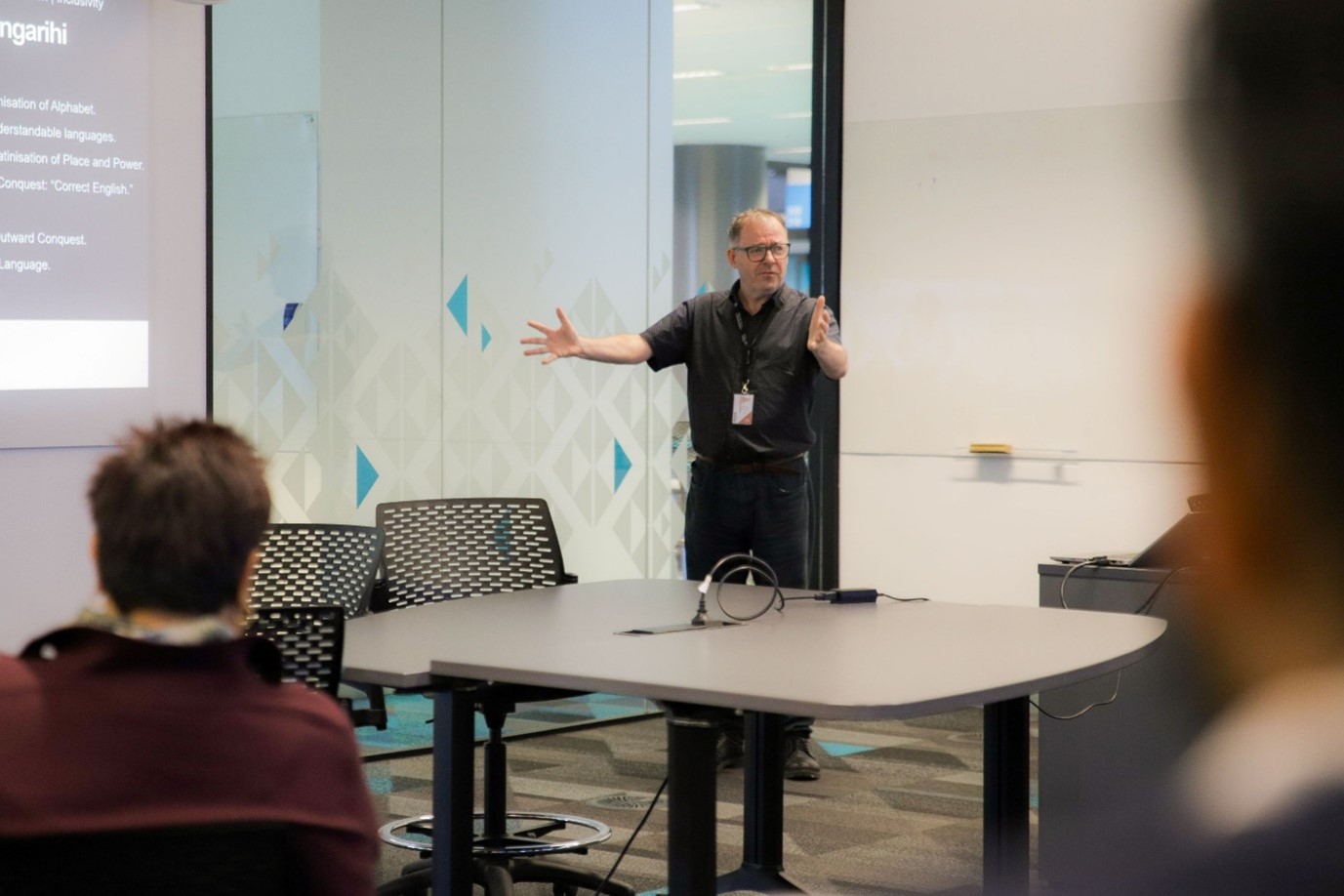David McCurdy delivered the third talk in the Xchange Series at Manukau Campus on Wednesday, September 22, 2025. In response to requests, Mr McCurdy repeated it online in October.
The talk was titled “Addressing the Invisible Barriers: English Language Complications Faced by Technical Learners.”
David explored how the historical layering and “fossil record” of the English language creates unnecessary hurdles for students in digital technology and other programmes at polytechnics like MIT.

The Complication: English as a Colonised Language
Mr McCurdy began by going back over the whakapapa (lineage) of English, demonstrating that it is a language that he says has been colonised by history.
“Following the Norman Conquest, an enormous divide was cemented. Simple, Germanic vocabulary was retained by common people, while complex, Norman-French vocabulary became the language for law, academia, and the elites,” he says.
“This linguistic split is an example of a challenge faced by modern learners at tertiary and secondary institutions. The challenge is compounded by the fact that English spelling was fossilised by the printing press in the 15th and 16th centuries, specifically before the Great Vowel Shift fundamentally changed how English was spoken.”
“This created the permanent, confusing disconnect between sound and symbol in many words. This is part of the reason English is a challenge to learn as a second language.”
“While technical fields like coding and data analysis demand clarity and precision, academic instructions found in tertiary institutions often use obscure Latin terms.”
“Examples of this include: ‘ameliorate’ instead of ‘improve’ or ‘delineate’ instead of ‘define’. This practice acts as a cultural and socio-economic impediment, disadvantaging students for whom English is a second language, or who come from non-elite backgrounds. The language itself has become an instrument of power, not for everyday use.”
Why it Matters: Simplicity for Equity
“I believe that in technical education like Digital Technologies, linguistic complexity is a direct barrier to learning and equity. When assessment instructions are obscured by verbose language and passive voice, students struggle to understand the core technical task they are being asked to complete.”
“We need a Plain Technical English as a standard. This approach mandates the elimination of jargon and the use of direct, active voice instructions. For example: “Code the function,” or “Test the output”. The goal is to maximise accessibility, ensuring that the student is assessed on their technical competence, not their mastery of historically complex academic vocabulary.”
Engaging Discussion
The talk concluded with a lively Q&A session where attendees explored the practical application of these principles in designing assessments. Participants discussed how Large Language Models (LLMs) and Artificial Intelligence (AI) tools could be used by educators to automatically detect and replace unnecessarily complex, abstract vocabulary in technical assessment briefs. The consensus was that applying linguistic decolonisation principles, such as removing overly formal terms, is a vital step toward creating more inclusive and equitable learning environments across all Digital Technologies’ courses.
About the Author
David McCurdy is a lecturer in Digital Technologies whose research spans linguistic history, adult education principles, and the application of Plain English standards to complex technical and historical documentation. His work bridges historical critique and practical pedagogy, aiming to deliver clear and accessible learning materials. David has Master’s degrees in both Education and Robotics, as well as postgraduate qualifications in Indigenous Studies and Theology.
About the Series
The Xchange: MIT Digital Technologies Seminar Series is a monthly forum for staff and invited speakers to share research, teaching innovations, and industry insights. It showcases MIT’s expertise, strengthens collaboration, and translates ideas into practice and publications.
If you’re interested in presenting at a future Xchange talk—or nominating an external speaker—please get in touch with Dr Ahmad Wedyan ahmad.wedyan@manukau.ac.nz






